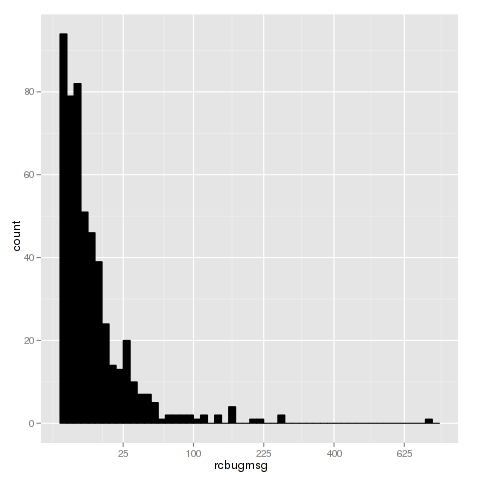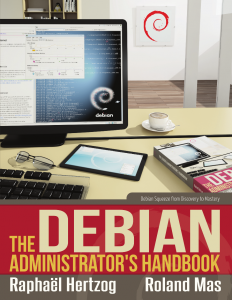
The package
mime-support is installed by default on Debian
systems. It has two roles: first to provide the file
/etc/mime.types that
associates
media types (formerly called
MIME types) to suffixes of file
names, and second to provide the
mailcap system that associates
media types with programs. I
adopted this package at the
end of the development cycle of
Wheezy.
Changes since
Wheezy.
The version distributed in
Jessie brings a few additions in
/etc/mime.types. Among them,
application/vnd.debian.binary-package
and
text/vnd.debian.copyright,
which as their name suggest describe two file formats designed by Debian. I
registered these types to the
IANA,
which is more open to the addition of new types since the
RFC
6838.
The biggest change is the automatic extraction of the associations between
programs and media types that are declared in the menu files in
FreeDesktop
format.
Before, it was the maintainer of the Debian package who had to extract this
information and translate it in
mailcap format by hand. The automation is
done via
dpkg triggers.
A big thank you to Kevin Ryde who gave me a precious help for the
developments and corrections to the
run-mailcap program, and to all the
other
contributors.
Your help is always welcome!
Security updates.
In December, Debian has been contacted by Timothy D. Morgan, who found that
an attacker could get
run-mailcap to execute commands by inserting them in
file names
(
CVE-2014-7209).
This first security update for me went well, thanks to the help and
instructions of Salvatore Bonaccorso from the Security team. The problem is
solved in
Wheezy,
Jessie and
Sid, as well as in
Squeeze through its
long term support.
One of the consequences of this security update is that
run-mailcap will
systematically use the absolute path to the files to open. For harmless
files, this is a bit ugly. This will perhaps be improved after
Jessie is
released.
Future projects
The file
/etc/mime.types is kept up to date by hand; this is slow and
inefficient. The package
shared-mime-info contains similar
information, that could be used to autogenerate this file, but that would
require to parse a XML source that is quite complex. For the moment, I am
considering to import Fedora's
mailcap package, where
the file
/etc/mime.types is very well kept up to date. I have not yet
decided how to do it, but maybe just by moving that file from one package to
the other. In that case, we would have the
mime-support package that
would provide
mailcap support, and the package whose source is Fedora's
mailcap package who would provide
/etc/mime.types. Perhaps it will be
better to use clearer names, such as
mailcap-support for the first and
media-types for the second?
Separating the two main functionalities of
mime-support would have an
interesting consequence: the possibility of not installing the support for
the
mailcap system, or to make it optional, and instead to use the
FreeDesktop sytem (
xdg-open), from the package
xdg-utils.
Something to keep in mind...
 In March I was assigned 16 hours of work by Freexian's Debian LTS
initiative and carried over 8 hours from February. I worked 16 hours,
and will carry over the remaining time to April.
I backported the mitigations for Spectre-BHB (CVE-2022-0001,
CVE-2022-0002) on x86 processors, to Linux 4.9. I worked together
with Salvatore Bonaccorso in preparing the kernel updates that were
needed in all suites, and writing advisory text. I uploaded both
the linux (4.9) and linux-4.19 packages to stretch, and issued
DLA-2940-1
and DLA-2941-1.
I also triaged new issues that were reported later in the month.
In March I was assigned 16 hours of work by Freexian's Debian LTS
initiative and carried over 8 hours from February. I worked 16 hours,
and will carry over the remaining time to April.
I backported the mitigations for Spectre-BHB (CVE-2022-0001,
CVE-2022-0002) on x86 processors, to Linux 4.9. I worked together
with Salvatore Bonaccorso in preparing the kernel updates that were
needed in all suites, and writing advisory text. I uploaded both
the linux (4.9) and linux-4.19 packages to stretch, and issued
DLA-2940-1
and DLA-2941-1.
I also triaged new issues that were reported later in the month.

 Like
Like  Debian
devscripts
Before deciding to take an
Debian
devscripts
Before deciding to take an  My monthly report covers what I have been doing for Debian. I write it for Debian s Long Term Support sponsors but also for the wider free software community in the hope that it might inspire people to get more involved with Debian or free software in general.
Debian Android
My monthly report covers what I have been doing for Debian. I write it for Debian s Long Term Support sponsors but also for the wider free software community in the hope that it might inspire people to get more involved with Debian or free software in general.
Debian Android
 What happened in the
What happened in the  Thorsten Glaser reported Debian
Thorsten Glaser reported Debian  Well, here are the stats for the final week of the
Well, here are the stats for the final week of the  Pevious articles are here:
Pevious articles are here:  The package
The package  Debian LTS - feedback about the feedback from my LTS talk at DebConf14
So, I'm more or less back from dc14 and today, five days later, I think I might have mostly overcome jetlag. Probably...
So, at DebConf14 I gave a
Debian LTS - feedback about the feedback from my LTS talk at DebConf14
So, I'm more or less back from dc14 and today, five days later, I think I might have mostly overcome jetlag. Probably...
So, at DebConf14 I gave a  Oh, and surely there are other places than just the security-tracker which will need to be taught about this.
Oh, and surely there are other places than just the security-tracker which will need to be taught about this.
 Yesterday I spent a while looking at the
Yesterday I spent a while looking at the  As the first and third quantile are close together we can assume that the majority of the work is done by a few, especially since the second quantile is 5. This is supported by the histogram below, where the x axis is the number of recorded messages and y is the number of developers.
As the first and third quantile are close together we can assume that the majority of the work is done by a few, especially since the second quantile is 5. This is supported by the histogram below, where the x axis is the number of recorded messages and y is the number of developers.

 Big release notes since 1.0:
We ve got a new list
Big release notes since 1.0:
We ve got a new list  I just realized it's sunday again, so here goes my list of RC bugs I've
worked on during the last week:
I just realized it's sunday again, so here goes my list of RC bugs I've
worked on during the last week:
 Dpkg
Thanks to Guillem, dpkg with multiarch support is now available in Debian sid. The road has been bumpy, and it has again been delayed multiple times even after Guillem
Dpkg
Thanks to Guillem, dpkg with multiarch support is now available in Debian sid. The road has been bumpy, and it has again been delayed multiple times even after Guillem 